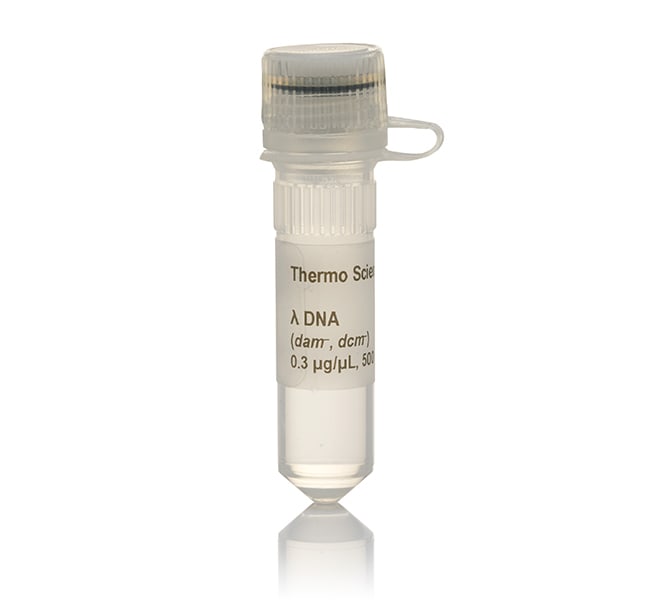Search

Thermo Scientific™
Lambda DNA (dam–, dcm–)
Thermo Scientific Lambda is a temperate Escherichia coli bacteriophage. The virion DNA is linear and double-stranded (48502 bp) with 12Read more
| Catalog Number | Quantity |
|---|---|
| SD0021 | 500 μg |
Catalog number SD0021
Price (CNY)
564.00
500 µg
Quantity:
500 μg
Price (CNY)
564.00
500 µg
Thermo Scientific Lambda is a temperate Escherichia coli bacteriophage. The virion DNA is linear and double-stranded (48502 bp) with 12 bp single-stranded complementary 5’-ends. After the phage particle injects its chromosome into the cell, the chromosome circularizes by end joining. In the lytic pathway, phage genes encoding replication, lysis, and virion proteins are expressed. The chromosome replicates, and the replicas are cleaved and packaged into progeny phage particles. In the lysogenic pathway, phage gene expression is repressed, and the circular chromosome inserts into the bacterial chromosome by recombination.
Features
Phage lambda DNA is a common substrate for restriction endonucleases and for generating DNA size marker fragments. For large scale isolation of phage DNA, cI857Sam7, a mutant carrying four known mutations, is often used. The DNA sequence used to construct a phage alpha restriction map includes these mutations.
Lambda DNA (dam-, dcm-) is isolated from a heat-inducible lysogenic E. coli GM2163 strain.
Applications
• Activity and specificity assays of restriction enzymes sensitive to Dam or Dcm methylation
• Preparation of DNA molecular weight standards
• Cloning
GenBank/EMBL Accession Numbers
J02459, M17233, M24325, V00636, X00906
Features
Phage lambda DNA is a common substrate for restriction endonucleases and for generating DNA size marker fragments. For large scale isolation of phage DNA, cI857Sam7, a mutant carrying four known mutations, is often used. The DNA sequence used to construct a phage alpha restriction map includes these mutations.
Lambda DNA (dam-, dcm-) is isolated from a heat-inducible lysogenic E. coli GM2163 strain.
Applications
• Activity and specificity assays of restriction enzymes sensitive to Dam or Dcm methylation
• Preparation of DNA molecular weight standards
• Cloning
GenBank/EMBL Accession Numbers
J02459, M17233, M24325, V00636, X00906
For Research Use Only. Not for use in diagnostic procedures.
Specifications
Concentration0.3 μg/μL
Final Product TypeDNA
For Use With (Application)CloningNucleic Acid Gel Electrophoresis
Includes[other]
Product TypeLambda DNA
Quantity500 μg
Sample TypeDNA
SpeciesLambda phage
Unit Size500 µg